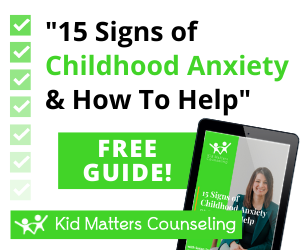Do you struggle to understand why your child speaks and thinks so poorly of themselves? Maybe you hear your child say things like “I’m stupid,” “nobody likes me,” or “I’m not good enough.” Sometimes helping your child gain confidence can feel confusing, frustrating and overall challenging!
And yet, you want your child to be confident, positive, and resilient.
You are not alone in this struggle! As a trained child therapist specializing in play therapy, I work with a variety of emotional and behavioral issues and more often than not, lowered self-esteem accompanies these challenges. What I have found to be effective is teaching your child how to replace their judgment words with feeling words. This can stop the cycle of self-criticism and lowered self-esteem.
Through 3 easy steps you can help your child gain confidence today:
1. Understand the difference between a feeling word and a judgment word.
Feeling words describe our interpretation of our body sensations:
Sad, anxious, angry, frustrated, fearful, lonely, overwhelmed, resentful, annoyed, etc.
Judgment words describe our opinion of a situation, often assigning judgment to oneself or someone else:
Betrayed, disliked, left out, unworthy, attacked, stupid, misunderstood, manipulated, rejected, etc.
2. Help your child navigate this difference through one simple question:
When you tell yourself that you are (insert judgement word), how do you feel?
3. Meet the need(s) of the underlying feeling.
This can be a variety of things based on the feeling. Some examples could be giving them a hug, helping them solve a problem, or merely validating their feelings.
So when your child says something like “I feel stupid” you can respond with “Oh wow, stupid is a strong word. I wonder, what is the feeling behind that word? When you tell yourself you are stupid, how do you feel?”
It would be understandable If your child cannot come up with a new feeling or they stick with their original “I feel stupid”. This is where you can offer an alternative feeling OR present them with a list of feeling words.
You can say something like, “Maybe you feel overwhelmed and sad when your friends beat you in that game. I know you want to be good at that game. It makes sense that you would want to be good at that game!”
In this situation you validated their feelings of overwhelm and sad.
When you name the underlying feeling and then meet the need within that feeling you will teach your child how to use feeling words instead of judgement words. Less judgement words will lead to less judgement and less self-criticism, which will then lead to increased confidence.
Following these 3 steps will help you teach your child how to be more confident by knowing the difference between a feeling and a judgement. This will help them increase their self-esteem.
If your child continues to struggles with self-esteem issues, there might be more underlying issues to explore. Please reach out to a child therapist in your area or any one of us at Kid Matters Counseling.

Keri Sawyer
Child Therapist | MA
You and your child are doing the best you can! As a child therapist work with parents and their children to help facilitate a balance between striving for success AND maintaining health and mental stability.
Kid Matters Counseling has trained therapists ready to help both kids and parents walk through the tough moments in life.
End the frustration & the confusion and let's work together! SCHEDULE APPOINTMENTNew Clients Call: (855) 586-1802
Current Clients: (855) 543-7687
Ask Us Anything!
We help anxious kids and frustrated parents. We serve Hinsdale & the Western Suburbs of Chicago.
Made with ♥︎ in Hinsdale, Illinois for Chicago
Built By Brand Your Practice.
Kid Matters Counseling, P.C. DISCLAIMER: This website and blog are for informational, educational and general discussion purposes only. It is understood that no guarantee or warranty arises from the information provided, discussed or commented upon in this website and blog nor does it constitute legal or other professional advice on any subject matter. Access to this website and blog is voluntary and at the sole risk of the user. If you think that you have a medical emergency (including clinical), call your doctor or 911 immediately. A licensed medical professional should be consulted for diagnosis and treatment of any and all medical conditions. While the information contained within this website and blog is periodically updated, no guarantee is given that the information provided is correct, complete, and/or up-to-date. See our complete Privacy Policy and Terms of Service.



